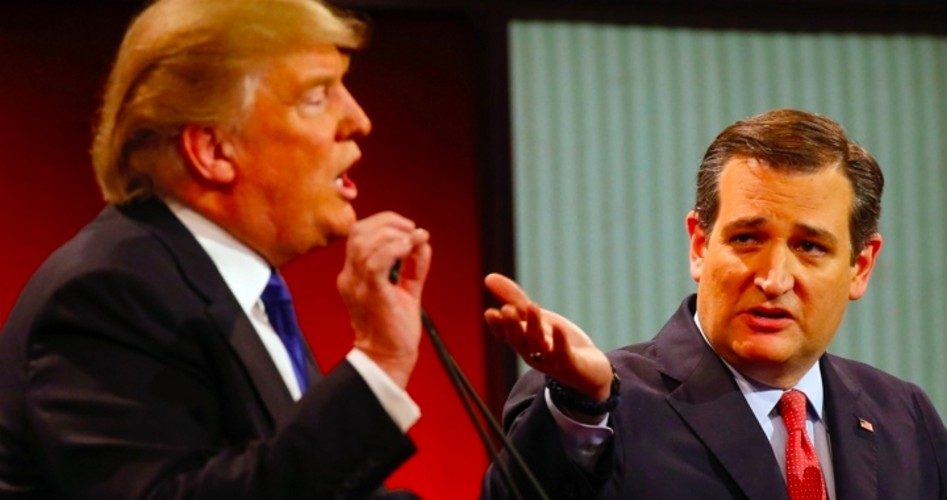
New York real estate tycoon Donald Trump and Texas Senator Ted Cruz split the four Republican Party contests on Saturday, with Cruz adding a straw poll win at the Conservative Political Action Conference (CPAC).
On the Democratic Party side, Senator Bernie Sanders of Vermont defeated former Secretary of State Hillary Clinton in caucuses in Nebraska and Kansas, but Clinton easily beat Sanders in the primary state of Louisiana.
Trump began the day with a strong lead in the total number of delegates, with 375, compared to Cruz at 291, Florida Senator Marco Rubio with 123, and Ohio Governor John Kasich with 33. Fifteen more delegates were scattered among five other Republican hopefuls, who have now suspended their campaigns. Trump’s wins in several southern states on Super Tuesday led many pundits to conclude that his momentum would carry him to a sweep of the four Saturday contests.
But that did not prove to be the case. In fact, Cruz actually tightened the race, picking up more delegates on Saturday than did Trump, raising the question as to whether there has been a shift in momentum to Cruz, and if so, why, and what does that mean for the remainder of the 2016 Republican race?
The first contest to be decided was in Kansas, where caucus goers handed Cruz a decisive victory over Trump, by a margin of 48-23 percent. Rubio trailed with almost 17 percent. The next results came from Maine, where Cruz notched his second victory of the day, garnering almost 46 percent of the vote to less than 33 percent for Trump. Here, Ohio Governor John Kasich took 12 percent of the vote, followed by Rubio at 8 percent. Rubio’s anemic showing in Maine meant that he would receive no delegates at all from that state. Although a proportional state, party rules stipulated that anyone getting a majority of the vote would get all of the state’s delegates.
Attention next went to Kentucky, where Senator Rand Paul had convinced the state party to go to a caucus system earlier in the nomination process. Since Paul is up for reelection to the Senate seat he first won in 2010, this was by design so that if Paul’s presidential campaign was not successful, he would be able to run for a second Senate term.
Here, Trump was able to slow down Cruz’s Super Saturday momentum. Trump won with almost 36 percent of the vote, followed by Cruz at 31.6 percent. Rubio trailed with 16 percent.
Louisiana was considered the big prize of the evening. When absentee and early voting results were released first, it appeared that Trump was going to score not only a victory, but a huge double-digit victory over Cruz and the rest of the field. But, as the night wore on, and election day voting results were included in the tally, Trump’s lead began to shrink until Cruz was within four percentage points of the New York billionaire. The final totals stood at 41 for Trump and almost 38 percent for Cruz. Rubio was a distant third at 11 percent.
Although irrelevant for the delegate count, Cruz bagged another victory on Saturday, when he won the CPAC poll by a large margin, 40-30 percent over Marco Rubio. Trump trailed at only 15 percent. CPAC tends to attract a younger, more libertarian-minded, and less pragmatic, crowd than most Republican caucuses and primaries, with Senator Rand Paul, and his father, Ron Paul having won previous CPAC straw polls. With neither Paul on the ballot, the attendees evidently considered the Texas senator (who has made an overt appeal to libertarian-minded Republicans) the most conservative candidate left in the race.
What are we to make of these results on Super Saturday?
While Trump remains the front-runner for the nomination, it has become apparent that Cruz has picked up momentum while Trump’s momentum has slowed, at least for now. In fact, Cruz actually gained more delegates on Saturday than Trump.
In Louisiana, where Trump won, a close look at the results shows this apparent shift in momentum. In absentee voting, and early in-person voting, Trump’s totals seemed to confirm that he would have a huge victory in the state. Trump took almost 47 percent of the before-election day vote, to a mere 23 percent for Cruz. It should also be noted that Rubio had 20 percent, and Kasich had just under four percent. But, Cruz won a plurality of those who actually showed up on election day to vote, by a very narrow margin, 40.9 percent to 40.5 percent for Trump.
Why did this happen? It appears that Rubio’s support imploded, dropping from 20 percent to only 9 percent. Kasich, on the other hand, actually increased his totals from 3.7 percent to almost 7 percent! Trump’s totals declined by six percentage points, while Cruz gained an amazing 18 percent. Some noted that Cruz’s “ground game,” or organization, was the best of the field, and this no doubt contributed to Cruz’s performance on election day. But could the large difference between Cruz’s pre-election-day and election-date performances be attributed mostly to his ground game? A reasonable conclusion is that Trump’s support in Louisiana dropped prior to election day, and that some once planning to vote for Trump likely ended up voting for Cruz instead on election day. But the more stark observation is that Rubio lost over half of his support in Louisiana. The bulk of that must have gone to Cruz as opposed to Kasich, considering the latter’s poor performance in the state.
Rubio performed poorly not only in Louisiana but in all four Super Saturday Republican contests, strengthening Cruz’s case that he is the main competitor to Trump. And with Cruz obviously believing that declining support for Rubio would benefit him more than any other candidate including Trump (in fact, it’s hard to imagine many Rubio supporters switching to Trump), Cruz has now beefed up his operations in Rubio’s home state of Florida and stepped up calls for Rubio to exit the race.
After winning two of the four Super Saturday Republican contests, Cruz called for all conservatives to join his candidacy, calling the results a “manifestation of a real shift in momentum.”
After the Kentucky results were announced in his favor, Trump held an extended press conference (where the TV audience was unable to actually hear the questions, but could hear his responses). In the conference, Trump congratulated Cruz on his victories in Kansas and Maine, while noting that he was not surprised that Cruz won in Maine, because “it is so close to Canada.” The humorous barb was intended to spotlight the Trump assertion that Cruz does not meet the constitutional qualification of being a “natural born citizen,” because Cruz was born in Canada. Those who argue Cruz is qualified base their position on the American citizenship of his mother.
It is clear that Trump is trying to solidify his support and improve his ground game for the many remaining state contests. At a rally in Orlando Saturday, Trump asked the audience to raise their hands and pledge to get to the polls and vote for him “no matter what.”
At Thursday’s GOP debate in Detroit, Trump was hit hard by Rubio and Cruz over his hiring of foreign workers as wait staff at some of his Florida eating establishments. He also said he was “softening” his position on H-1B visas, saying that “we have to have talented people in this country.” Since a good part of Trump’s support has come from citizens angry at the out-of-control immigration problem, this could be causing some who were looking at supporting him to waver.
His assertion that he would order the military to target the families of terrorists, or that he would go beyond waterboarding, both in contradiction of federal law, could also cause him problems over time, particularly with military personnel (and their families) who may be given unlawful orders. However, after Thursday’s debate, he said he would abide by the law. And then he said he would get torture laws changed.
The next Republican contests are in Hawaii, Idaho, Michigan, and Mississippi on Tuesday, March 8, with the next debate set for Thursday, March 10, in Miami, Florida.
The Democratic Party contests are much simpler to analyze, with only two candidates vying for the nomination. Senator Sanders is doing better in states with more white voters, while Secretary Clinton does well in states with a high number of African-American or Hispanic voters. Sanders won two of the Democrat contests on Saturday (in Kansas and Nebraska), while Clinton won one (Louisiana). The “elephant in the room” that could potentially alter the outcome of the Democratic contest is whether a federal grand jury will indict Clinton in the e-mail scandal. If that happens, the deck will certainly be reshuffled in the Democrat race.
After the Democrat contest in Maine today, the Democrats have contests Tuesday in Michigan and Mississippi.
Photo of Donald Trump and Sen. Ted Cruz (from the Republican debate in Detroit): AP Images
Steve Byas is a professor of history at Hillsdale Free Will Baptist College in Moore, Oklahoma. His book History’s Greatest Libels is a challenge to some of the lies told about such personalities as George Washington, Thomas Jefferson, and Warren Harding.

